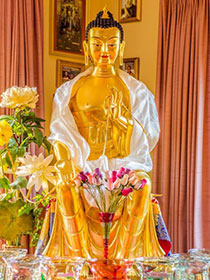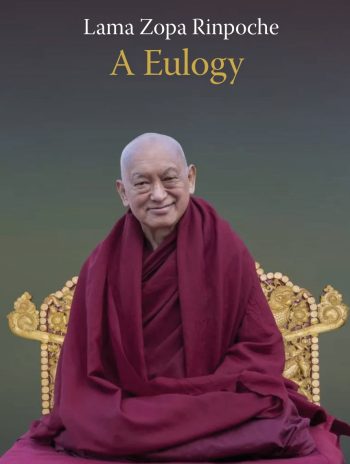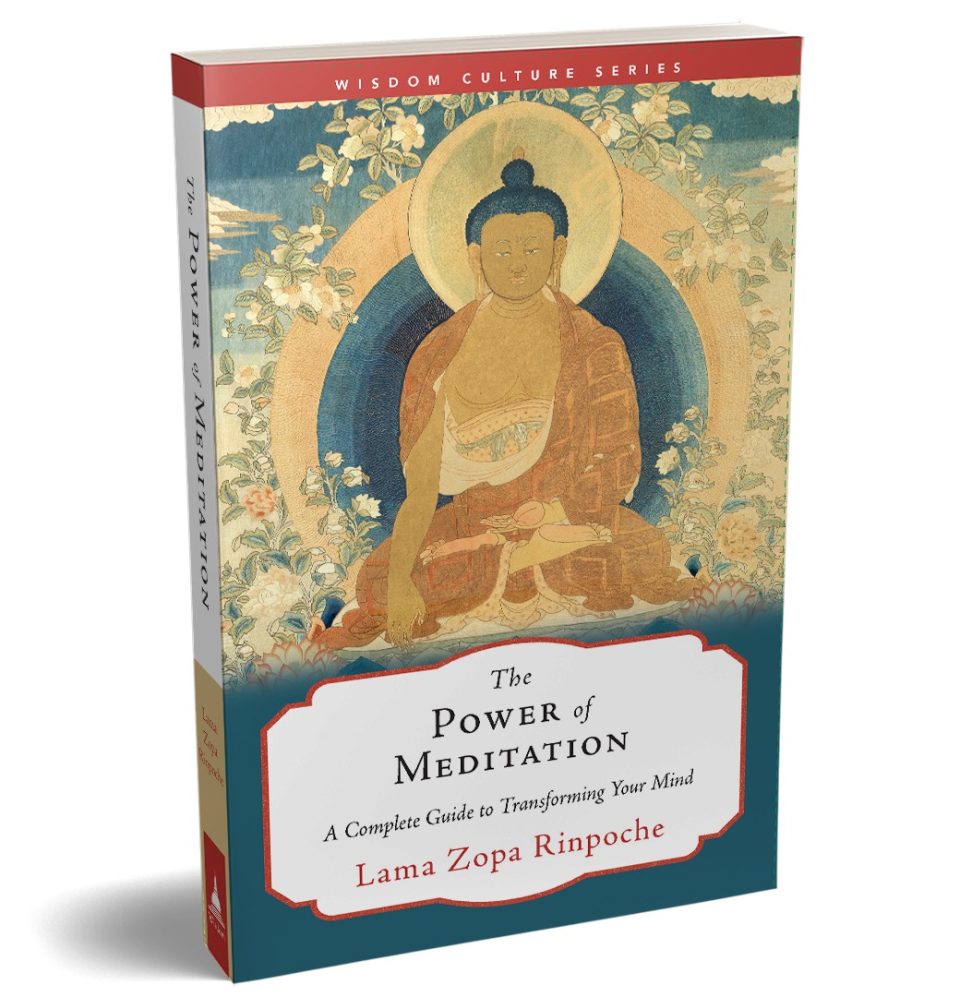- Home
- FPMT Homepage
Foundation for the Preservation of the Mahayana Tradition
The FPMT is an organization devoted to preserving and spreading Mahayana Buddhism worldwide by creating opportunities to listen, reflect, meditate, practice and actualize the unmistaken teachings of the Buddha and based on that experience spreading the Dharma to sentient beings. We provide integrated education through which people’s minds and hearts can be transformed into their highest potential for the benefit of others, inspired by an attitude of universal responsibility and service. We are committed to creating harmonious environments and helping all beings develop their full potential of infinite wisdom and compassion. Our organization is based on the Buddhist tradition of Lama Tsongkhapa of Tibet as taught to us by our founders Lama Thubten Yeshe and Lama Thubten Zopa Rinpoche.
- Willkommen
Die Stiftung zur Erhaltung der Mahayana Tradition (FPMT) ist eine Organisation, die sich weltweit für die Erhaltung und Verbreitung des Mahayana-Buddhismus einsetzt, indem sie Möglichkeiten schafft, den makellosen Lehren des Buddha zuzuhören, über sie zur reflektieren und zu meditieren und auf der Grundlage dieser Erfahrung das Dharma unter den Lebewesen zu verbreiten.
Wir bieten integrierte Schulungswege an, durch denen der Geist und das Herz der Menschen in ihr höchstes Potential verwandelt werden zum Wohl der anderen – inspiriert durch eine Haltung der universellen Verantwortung und dem Wunsch zu dienen. Wir haben uns verpflichtet, harmonische Umgebungen zu schaffen und allen Wesen zu helfen, ihr volles Potenzial unendlicher Weisheit und grenzenlosen Mitgefühls zu verwirklichen.
Unsere Organisation basiert auf der buddhistischen Tradition von Lama Tsongkhapa von Tibet, so wie sie uns von unseren Gründern Lama Thubten Yeshe und Lama Thubten Zopa Rinpoche gelehrt wird.
- Bienvenidos
La Fundación para la preservación de la tradición Mahayana (FPMT) es una organización que se dedica a preservar y difundir el budismo Mahayana en todo el mundo, creando oportunidades para escuchar, reflexionar, meditar, practicar y actualizar las enseñanzas inconfundibles de Buda y en base a esa experiencia difundir el Dharma a los seres.
Proporcionamos una educación integrada a través de la cual las mentes y los corazones de las personas se pueden transformar en su mayor potencial para el beneficio de los demás, inspirados por una actitud de responsabilidad y servicio universales. Estamos comprometidos a crear ambientes armoniosos y ayudar a todos los seres a desarrollar todo su potencial de infinita sabiduría y compasión.
Nuestra organización se basa en la tradición budista de Lama Tsongkhapa del Tíbet como nos lo enseñaron nuestros fundadores Lama Thubten Yeshe y Lama Zopa Rinpoche.
A continuación puede ver una lista de los centros y sus páginas web en su lengua preferida.
- Bienvenue
L’organisation de la FPMT a pour vocation la préservation et la diffusion du bouddhisme du mahayana dans le monde entier. Elle offre l’opportunité d’écouter, de réfléchir, de méditer, de pratiquer et de réaliser les enseignements excellents du Bouddha, pour ensuite transmettre le Dharma à tous les êtres. Nous proposons une formation intégrée grâce à laquelle le cœur et l’esprit de chacun peuvent accomplir leur potentiel le plus élevé pour le bien d’autrui, inspirés par le sens du service et une responsabilité universelle. Nous nous engageons à créer un environnement harmonieux et à aider tous les êtres à épanouir leur potentiel illimité de compassion et de sagesse. Notre organisation s’appuie sur la tradition guéloukpa de Lama Tsongkhapa du Tibet, telle qu’elle a été enseignée par nos fondateurs Lama Thoubtèn Yéshé et Lama Zopa Rinpoché.
Visitez le site de notre Editions Mahayana pour les traductions, conseils et nouvelles du Bureau international en français.
Voici une liste de centres et de leurs sites dans votre langue préférée
- Benvenuto
L’FPMT è un organizzazione il cui scopo è preservare e diffondere il Buddhismo Mahayana nel mondo, creando occasioni di ascolto, riflessione, meditazione e pratica dei perfetti insegnamenti del Buddha, al fine di attualizzare e diffondere il Dharma fra tutti gli esseri senzienti.
Offriamo un’educazione integrata, che può trasformare la mente e i cuori delle persone nel loro massimo potenziale, per il beneficio di tutti gli esseri, ispirati da un’attitudine di responsabilità universale e di servizio.
Il nostro obiettivo è quello di creare contesti armoniosi e aiutare tutti gli esseri a sviluppare in modo completo le proprie potenzialità di infinita saggezza e compassione.
La nostra organizzazione si basa sulla tradizione buddhista di Lama Tsongkhapa del Tibet, così come ci è stata insegnata dai nostri fondatori Lama Thubten Yeshe e Lama Zopa Rinpoche.
Di seguito potete trovare un elenco dei centri e dei loro siti nella lingua da voi prescelta.
- 欢迎 / 歡迎
简体中文
“护持大乘法脉基金会”( 英文简称:FPMT。全名:Foundation for the Preservation of the Mahayana Tradition) 是一个致力于护持和弘扬大乘佛法的国际佛教组织。我们提供听闻,思维,禅修,修行和实证佛陀无误教法的机会,以便让一切众生都能够享受佛法的指引和滋润。
我们全力创造和谐融洽的环境, 为人们提供解行并重的完整佛法教育,以便启发内在的环宇悲心及责任心,并开发内心所蕴藏的巨大潜能 — 无限的智慧与悲心 — 以便利益和服务一切有情。
FPMT的创办人是图腾耶喜喇嘛和喇嘛梭巴仁波切。我们所修习的是由两位上师所教导的,西藏喀巴大师的佛法传承。
繁體中文
護持大乘法脈基金會”( 英文簡稱:FPMT。全名:Found
ation for the Preservation of the Mahayana Tradition ) 是一個致力於護持和弘揚大乘佛法的國際佛教組織。我們提供聽聞, 思維,禪修,修行和實證佛陀無誤教法的機會,以便讓一切眾生都能 夠享受佛法的指引和滋潤。 我們全力創造和諧融洽的環境,
為人們提供解行並重的完整佛法教育,以便啟發內在的環宇悲心及責 任心,並開發內心所蘊藏的巨大潛能 — 無限的智慧與悲心 – – 以便利益和服務一切有情。 FPMT的創辦人是圖騰耶喜喇嘛和喇嘛梭巴仁波切。
我們所修習的是由兩位上師所教導的,西藏喀巴大師的佛法傳承。 察看道场信息:
- FPMT Homepage
- News/Media
-
- Study & Practice
-
-
- About FPMT Education Services
- Latest News
- Programs
- Online Learning Center
-
-
*If a menu item has a submenu clicking once will expand the menu clicking twice will open the page.
-
-
- Centers
-
- Teachers
-
- Projects
-
-
-
-
*If a menu item has a submenu clicking once will expand the menu clicking twice will open the page.
-
-
- FPMT
-
-
-
-
-
Once you realize the true evolution of your mental problems, you’ll never blame any other living being for how you feel.
Lama Zopa Rinpoche
-
-
-
- Shop
-
-
-
The Foundation Store is FPMT’s online shop and features a vast selection of Buddhist study and practice materials written or recommended by our lineage gurus. These items include homestudy programs, prayers and practices in PDF or eBook format, materials for children, and other resources to support practitioners.
Items displayed in the shop are made available for Dharma practice and educational purposes, and never for the purpose of profiting from their sale. Please read FPMT Foundation Store Policy Regarding Dharma Items for more information.
-
-
Lama Zopa Rinpoche News and Advice
24
This eulogy is also available to read on our website with translations into several languages.
Here we share on chapter from this beautiful tribute, describing Rinpoche’s early life:
“That Is My Home!”
Lama Thubten Zopa Rinpoche was born at sunrise on December 3, 1945, the last day of the tenth month of the Wood Bird year in the Tibetan lunar calendar, in Thangme, a village in the Khumbu region of Nepal, up in the Himalayas.
It was evident from the time he was two or three years old that he knew what he wanted. One of many children of a Sherpa family — he was called Dawa Chötor then — the moment his mother, Yangchen, turned her back, fetching water, checking on the potato fields, or collecting wood, he’d be gone, determinedly trudging his way up the long, steep, winding path that led to the cave of the Lawudo Lama, the revered local yogi Kunsang Yeshe who’d died a couple of years earlier.
They’d find him asleep in the resting place halfway up the mountain, his sister Ngawang Samten said. When they’d admonish him to “come home!” he’d point up towards the cave and say, “No, that is my home!”
Ani Samten said that somehow he was different from the other children, sitting apart, or sitting on a high box when he ate his meals. And when he’d play games, he’d always play the role of the lama: he’d lead pujas, give initiations, and announce the names of the Lawudo Lama’s benefactors, saying they’d be coming.
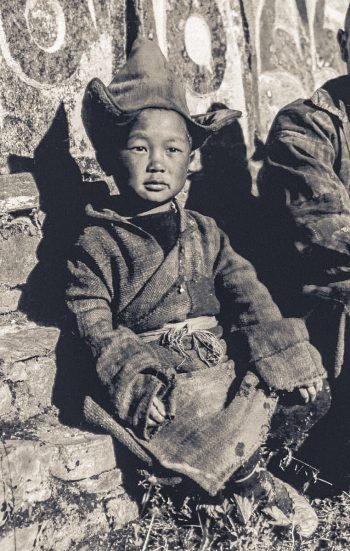
Lama Zopa Rinpoche as a child in Rolwaling. Photo by Tom Weir
When he was three, Rinpoche was delighted when the Lawudo Lama’s attendant, Ngawang Chöpel, came to visit. He cried and cried when he was leaving, declaring that he must go with him. Although soon recognized as the unmistaken reincarnation by many lamas, including the beloved local lama, Trulshik Rinpoche, it wasn’t until years later that the family of Lama Kunsang Yeshe, who was a lay yogi, accepted.
When he was five he was sent over the mountains to Rolwaling, west of Khumbu, to be educated by one of his uncles.
It was here, in 1952, that he first laid eyes on people with “white eyes and yellow hair,” as the Sherpas described Westerners, a group of them camping in a meadow on the other side of the river. Eager to meet them, he crossed the river on the makeshift bridge but fell into the water with his gift of boiled potatoes before reaching the other side. Rinpoche recounted later that while he was struggling to keep his head above water the thought occurred to him that the person known as the Lawudo Lama was about to die, but although he didn’t know anything about emptiness, “there was no fear.”
You can read the full eulogy written by Ven. Robina online, or download the newly available PDF for mobile phones and tablets.
Lama Zopa Rinpoche (1945-2023) was the spiritual director of the Foundation for the Preservation of Mahayana Tradition (FPMT), a Tibetan Buddhist organization dedicated to the transmission of the Mahayana Buddhist tradition and values worldwide through teaching, meditation and community service.
- Tagged: lama zopa rinpoche obituary
1
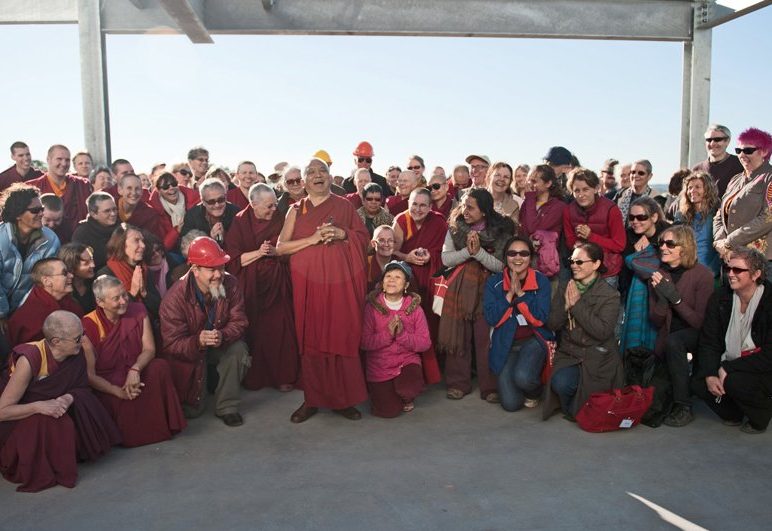
Lama Zopa Rinpoche and students participating in the retreat at the Great Stupa of Universal Compassion, Australia, April 2011. Photo by George Manos.
Recently we reminded students about three teaching events Lama Zopa Rinpoche offered on Bodhicaryavatara (A Guide to the Bodhisattva’s Way of Life) and Rinjung Gyatsa Retreat at the Great Stupa of Universal Compassion in Bendigo, Australia. These events occurred in 2011, 2014, and 2018, and are all available on our Rinpoche Available Now page.
That first retreat, attended by over 200 students, was referred to as a “retreat of a lifetime” by many of the participants. This retreat is also remembered as the time when Rinpoche manifested the symptoms of a stroke.
“This became an intense teaching on so many levels for all of us, whether we were physically present at the retreat or back in our daily lives. The importance of making your life meaningful is resonating in my mind and how we really need to put effort into transforming our minds,” Helen Patrin told Mandala at the time.
Ven. Thubten Kunsang, the French monk who until his death in 2016 recorded Rinpoche’s teachings, created short videos of the 2011 retreat. One of these videos shares many scenes with Rinpoche, including showing the open structure of the Great Stupa, where the teachings were held, before the Stupa’s exterior was complete. Other scenes include Rinpoche blessing insects, talking about the Mani caps, doing preta practice, and discussing the Namgyalma mantra. The video concludes with Rinpoche reminding us how our lives are all a hallucination. Please enjoy this short video, which contains so many joyful snippets of Rinpoche using every moment to benefit and inspire others:
For more information on the 2011 retreat, written after it occurred, read: “The Retreat of a Lifetime: Guru Devotion in Australia with Lama Zopa Rinpoche” and “When the Guru Manifests a Stroke: Ordinary Appearances and Extraordinary Teachings from Lama Zopa Rinpoche” from Mandala July-September 2011.
2011 Bodhicaryavatara (A Guide to the Bodhisattva’s Way of Life) and Rinjung Gyatsa Retreat in Australia is available to watch on our Rinpoche Available Now page, as are the 2014 and 2018 retreats.
Lama Zopa Rinpoche (1945-2023) was the spiritual director of the Foundation for the Preservation of Mahayana Tradition (FPMT), a Tibetan Buddhist organization dedicated to the transmission of the Mahayana Buddhist tradition and values worldwide through teaching, meditation and community service.
- Tagged: a guide to the bodhisattva's way of life, australia retreat 2011, bendigo, great stupa of universal compassion
20
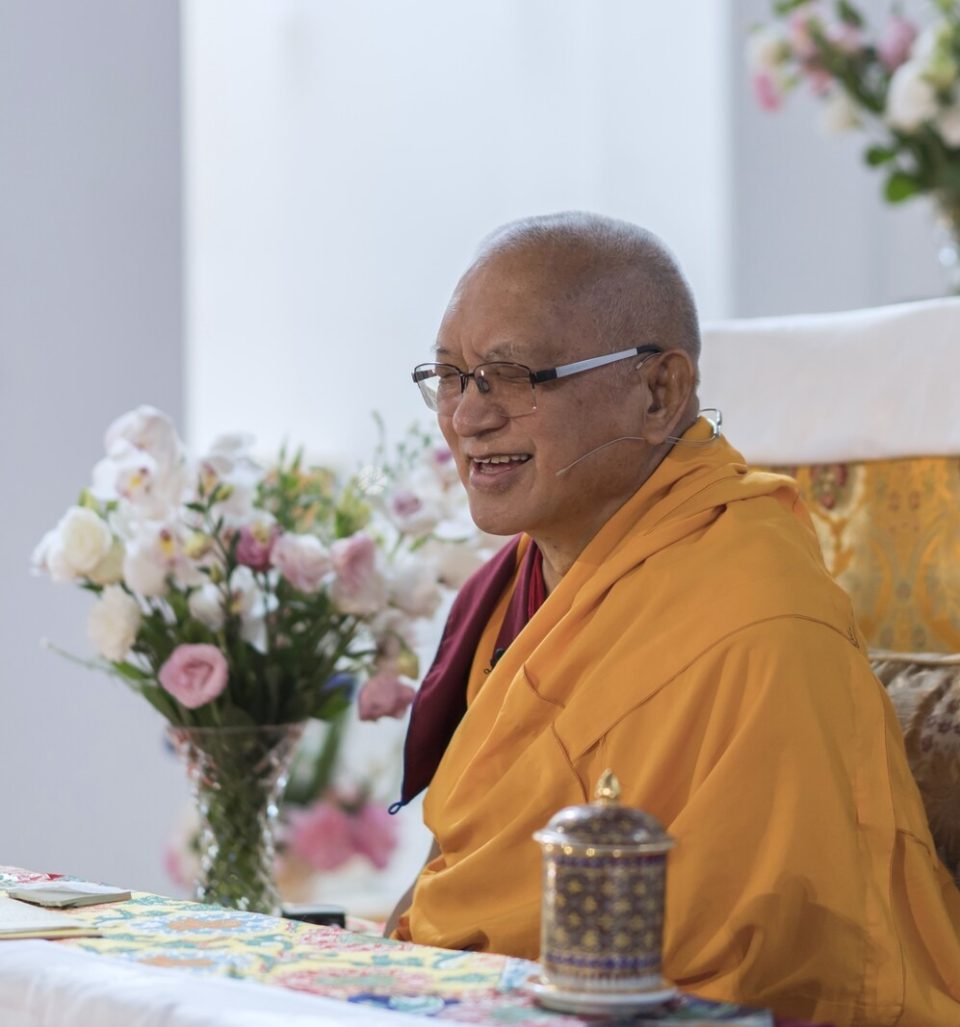
Lama Zopa Rinpoche teaching at the Great Stupa of Universal Compassion, Bendigo, AUS, April 3, 2018. Photo by Ven. Lobsang Sherab.
FPMT.org’s Rinpoche Available Now page is an incredibly rich resource for those wishing to explore full teaching events offered by Lama Zopa Rinpoche over the years.
In 2018 Lama Zopa Rinpoche spent six weeks leading the Bodhicaryavatara (A Guide to the Bodhisattva’s Way of Life) and Rinjung Gyatsa Retreat at the Great Stupa of Universal Compassion in Bendigo, Australia, offering more than sixty teachings. This was the third time Rinpoche offered this retreat series at the Great Stupa of Universal Compassion.
In early April 2011, Lama Zopa Rinpoche began teaching this retreat series, co-hosted by the Great Stupa, Atisha Centre, and Thubten Shedrup Ling Monastery, and attended by nearly 200 students, Rinpoche taught for about ten days before manifesting the symptoms of a stroke.
The first teachings in this series from 2011 are also available on the Rinpoche Available Now page. Rinpoche continued his retreat series at the Great Stupa in September-October 2014 (also available on the Rinpoche Available Now page) and in April-May 2018 (referenced here), and was scheduled to lead the March-April 2020 retreat, which was postponed due to the pandemic.
Video recordings of these teachings from 2018 are available, as well as additional teachings from this time at Chag-tong Chen-Tong Centre and Chenrezig Institute on our Rinpoche Available Now page. In addition to video recordings, unedited transcripts and audio files from these teachings are also made available for each teaching event.
Today we are sharing the video teaching, “Only Solution to Problems is to Practice Dharma and Subdue the Mind,” given on April 2, 2018 at the Great Stupa of Universal Compassion.
In this teaching Rinpoche stresses that we have experienced problems since beginningless rebirths and if we don’t practice Dharma in this life and actualize the path, these problems will just continue. Most of us only practice Dharma after everything else, and Dharma gets left out when we don’t have time. However, practicing Dharma is the most important thing, otherwise problems never finish. Thus, the only solution is to practice Dharma. To take care of oneself means not only taking care of the body, but subduing the mind. In fact, the best way to take care of the body is to take care of the mind. Practicing Dharma is to take care of oneself, but additionally to take care of the numberless sentient beings who are just like yourself, with bodhichitta. This is the most important.
Watch “Only Solution to Problems is to Practice Dharma and Subdue the Mind”:
2011 Bodhicaryavatara (A Guide to the Bodhisattva’s Way of Life) and Rinjung Gyatsa Retreat in Australia can be viewed here:
https://fpmt.org/media/streaming/teachings-of-lama-zopa-rinpoche/lama-zopa-rinpoche-teachings-in-bendigo-australia-2011/
2014 can be viewed here:
https://fpmt.org/media/streaming/teachings-of-lama-zopa-rinpoche/lama-zopa-rinpoche-teachings-in-australia/
2018 can be viewed here:
https://fpmt.org/media/streaming/teachings-of-lama-zopa-rinpoche/lama-zopa-rinpoche-teachings-in-bendigo-2018/
Lama Zopa Rinpoche (1945-2023) was the spiritual director of the Foundation for the Preservation of Mahayana Tradition (FPMT), a Tibetan Buddhist organization dedicated to the transmission of the Mahayana Buddhist tradition and values worldwide through teaching, meditation and community service.
- Tagged: advice from lama zopa rinpoche, bendigo, great stupa of universal compassion, rinpoche available now
12
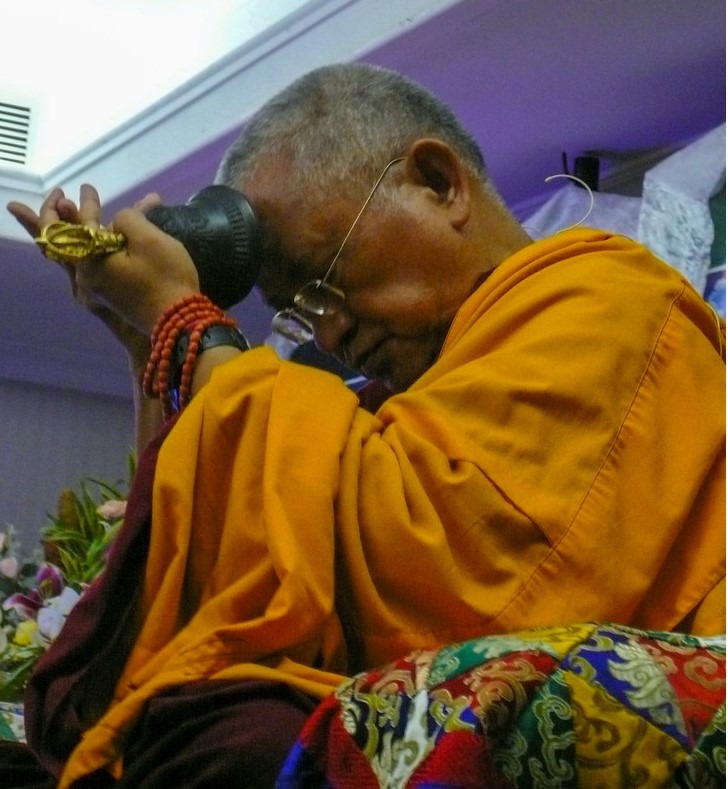
Lama Zopa Rinpoche, January 25, 2010, Indonesia.
From January 25 through February 7, 2010, Lama Zopa Rinpoche granted 12 sessions of teachings at Potowa Center in Indonesia. These teachings provided a comprehensive overview of key Buddhist concepts, focusing on how to integrate them into daily practice to progress on the path to enlightenment. We are pleased to share that all 12 videos from this event are now available on our RAN page.
Today, we are sharing the first video of these teachings, “The Urgent Need to Realize Emptiness.”
In this teaching, Rinpoche offered a commentary on the practice of Lama Chopa (Guru Puja).
Watch, “The Urgent Need to Realize Emptiness”
As a reminder, all of these sessions are now available for students to explore as they wish. On this page, you can also find a full combined transcript of these teachings, more information about the sessions, and MP3 audio download.
Foundation for the Preservation of Mahayana Tradition (FPMT), is a Tibetan Buddhist organization dedicated to the transmission of the Mahayana Buddhist tradition and values worldwide through teaching, meditation and community service.
5
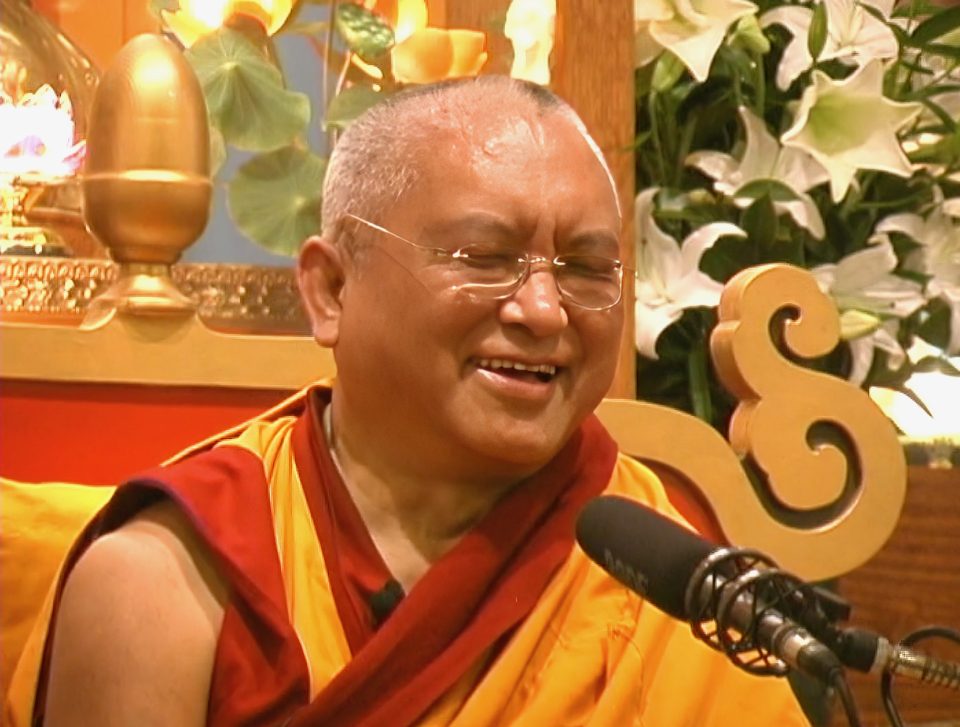
Lama Zopa Rinpoche teaching in Australia, June 2, 2006.
We were so pleased to recently make available, via video, teachings by Lama Zopa Rinpoche at Langri Tangpa Center, Brisbane, Australia from June 16-18, 2006. These four sessions of profound teachings are on the Eight Verses of Mind Training, a classic Tibetan Buddhist text by Kadampa Geshe Langri Tangpa, and offer deep insights into Buddhist philosophy and practice. Rinpoche covers a wide range of topics, including:
- The nature of emptiness and dependent arising
- How to recognize and refute the false view of inherent existence
- The importance of guru devotion on the spiritual path
- Developing bodhichitta, the altruistic intention to benefit all beings
- Practical advice on transforming daily activities into meaningful spiritual practice
As we announced previously, all four videos from this event are now available on our RAN page.
Today we are drawing your attention to the third video in this series, “Emptiness, Dependent Arising, and Overcoming Delusions.” In this session, held on June 18, 2006, Rinpoche delves deeper into the concept of emptiness, explaining how all phenomena, including the self, are empty of inherent existence. He emphasizes that everything exists as mere labels imputed by the mind, dependent on valid bases. Rinpoche discusses how recognizing this can help overcome delusions like anger and attachment, and alleviate depression. He uses everyday examples to illustrate these profound concepts, making them more accessible to the audience.
Watch, “3 Emptiness, Dependent Arising, and Overcoming Delusions”
https://www.youtube.com/watch?v=KXnp7vYOvnQ
As a reminder, all of these sessions are now available for students to explore as they wish.
Foundation for the Preservation of Mahayana Tradition (FPMT), is a Tibetan Buddhist organization dedicated to the transmission of the Mahayana Buddhist tradition and values worldwide through teaching, meditation and community service.
23
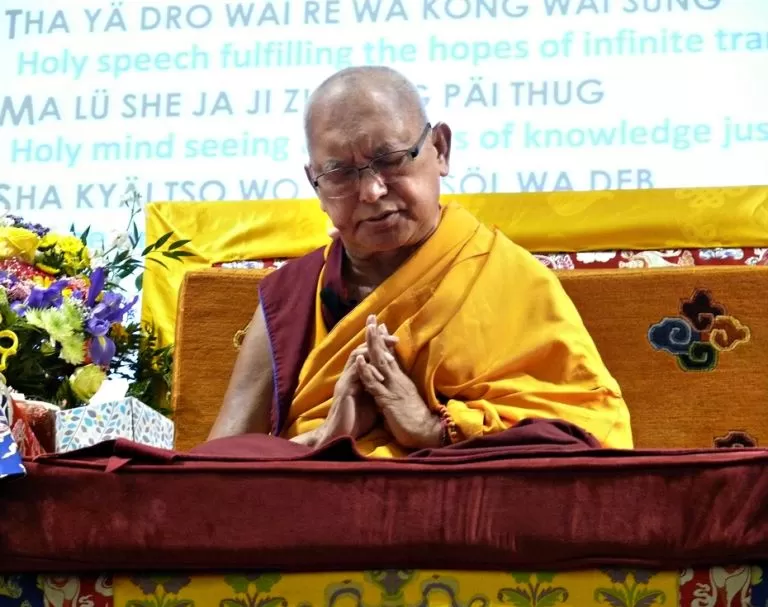
Lama Zopa Rinpoche at Light of the Path, Black Mountain, North Carolina, US, September 2017. Photo by Kalleen Mortensen.
As students of Lama Zopa Rinpoche, we are unbelievably blessed by the vastness of beneficial teachings left for us over decades, and in a wide variety of formats. We thought to bring your attention to one resource available to you, the Lama Zopa Rinpoche Essential Extracts page.
The essence of Lama Zopa Rinpoche’s teachings are extracted into stand-alone short videos focused on a specific topic. Most of these Essential Extract videos are available both as video only and also as video with transcript overlay.
Today we share one of these extracts, in which Rinpoche answers the following question from a student in the audience during the 2017 Light of the Path Retreat in North Carolina:
If you have a partner who is drowning at sea and there is somebody else exactly the same distance, who would you choose to help?
Find out how Rinpoche answered this question, in this short 6 minute extract:
Help All Beings without Discrimination
View the entire large collection of Essential Extracts.
Additionally, please explore the Essential Extracts Podcast, which features edited and condensed versions of these videos. Each fifteen to thirty minute episode focuses on a single topic, and includes edited and condensed audio extracts from longer teachings by Rinpoche. The Essential Extracts Podcast is available through popular podcasting apps and platforms, such as Apple Podcasts, Audible, Google Podcasts, Spotify, Overcast, Pocket Cast, and so forth. To find the show in a podcast app, search for the series title “Lama Zopa Rinpoche Essential Extracts.”
Lama Zopa Rinpoche (1945-2023) was the spiritual director of the Foundation for the Preservation of Mahayana Tradition (FPMT), a Tibetan Buddhist organization dedicated to the transmission of the Mahayana Buddhist tradition and values worldwide through teaching, meditation and community service.
- Tagged: discrimination, Essential Extracts
9
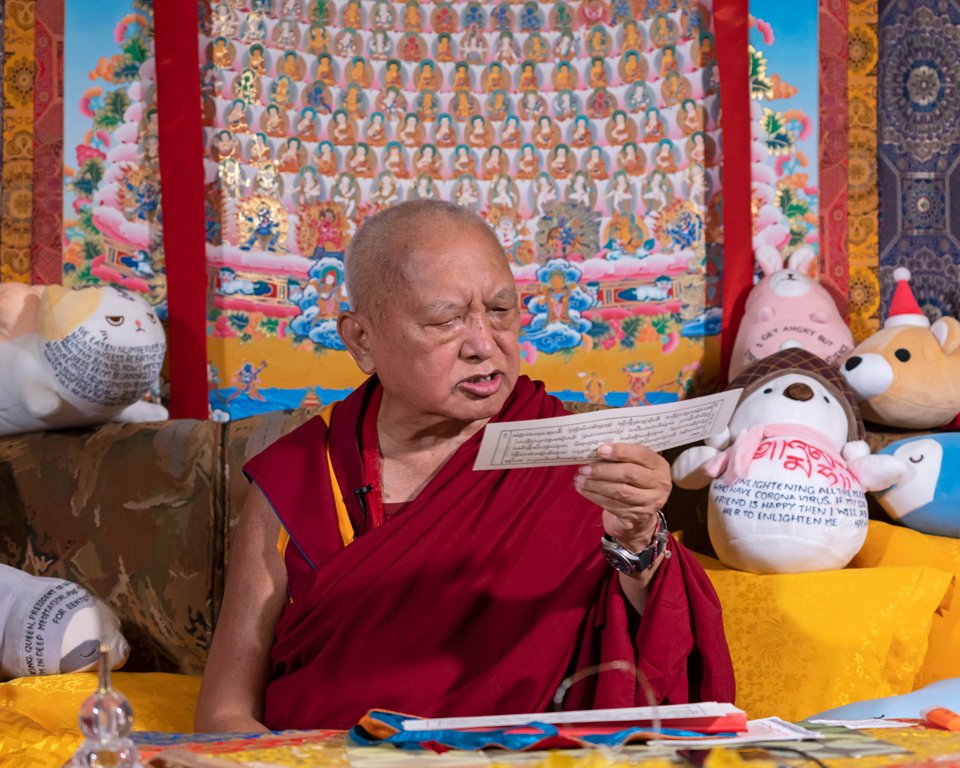
Lama Zopa Rinpoche giving the oral transmission of the Sutra of Great Liberation, Kopan Monastery, Nepal, March 2021. Photo by Ven. Lobsang Sherab.
Last year we shared the news that the Sutra of Great Liberation, a sutra which Lama Zopa Rinpoche stressed the inconceivable benefits of engaging with, had been translated into English by Ven. Gyalten Lekden of Sera Je Monastery. Today we are reminding you of this important sutra with the wish that all who have an interest will engage with it.
Rinpoche is reported to have spoken of the Sutra of Great Liberation as early as 2006, though it was especially in the later years of his teachings that Rinpoche began commenting on this sutra regularly. In 2020 Rinpoche asked Ven. Gyalten Lekden to translate this important sutra so that many people can read it in English explaining, “It is great to translate this, unbelievable. So many people can read it. Because most people can’t read Tibetan, they have to read English. Then they liberate so many sentient beings from lower realms, lower nirvana, and samsara, and they achieve enlightenment. It has unbelievable benefits if we translate it.”
The Sutra of Great Liberation is formally entitled, The Arya Mahayana Sutra Called “Arya All-Expansive Great Liberation, Purifying Negative Deeds through Cleansing Remorse, Perfectly Arranged Accomplishment of Buddhahood.” The Tibetan text, found in the Kangyur, is a translation of the Chinese rendition, the Sanskrit source text having been lost over the course of time.
Rinpoche has stressed the importance of this sutra, expounding on its benefits and giving the oral transmission of it, during the extensive series of thought transformation teachings given at Kopan Monastery.
Rinpoche emphasized that engaging with this sutra in any way, even unintentionally, has “unimaginable benefits.” He said that anyone who hears even the name of the sutra, writes, reads, prints, or keeps a copy of it collects unimaginable merit. Reciting it is an easy method to purify all the very negative karmas. Furthermore, anyone who memorizes, holds, or keeps a copy of it will become free from suffering, will never be reborn in the lower realms, and will become enlightened. The same is true for anyone who simply hears its powerful mantra. You can access the mantra from the Sutra of Great Liberation in PDF and audio formats; and also learn more about it.
Because of these benefits, Rinpoche recommended that we recite the sutra when we are able, and that it would even be beneficial to “keep the sutra.” Rinpoche noted, wherever a copy of this sutra is kept, this is a place where the Buddha himself resides.
Get the Sutra of Great Liberation in English:
shop.fpmt.org/the-sutra-of-great-liberation-ebook-pdf.html
Get the Tibetan pecha of the Sutra of Great Liberation (for printing):
shop.fpmt.org/Tibetan-Pecha-of-the-Sutra-of-Great-Liberation-PDF_p_3567.html
The oral transmission and commentary of the Sutra of Great Liberation can be found:
fpmt.org/tag/sutra-of-great-liberation
Newly available materials:
Sutra of Great Liberation MP3 Download:
shop.fpmt.org/Sutra-
The Sutra of Great Liberation in Russian:
shop.fpmt.org/The-
Please also note that The Sutra of Great Liberation is available as a Print on Demand on Amazon in various countries, so please check your local Amazon site if you are interested in a printed copy.
Through comprehensive study programs and practice materials, FPMT Education Services nourishes the development of compassion, wisdom, kindness, and true happiness in individuals of all ages.
- Tagged: sutra of great liberation
6
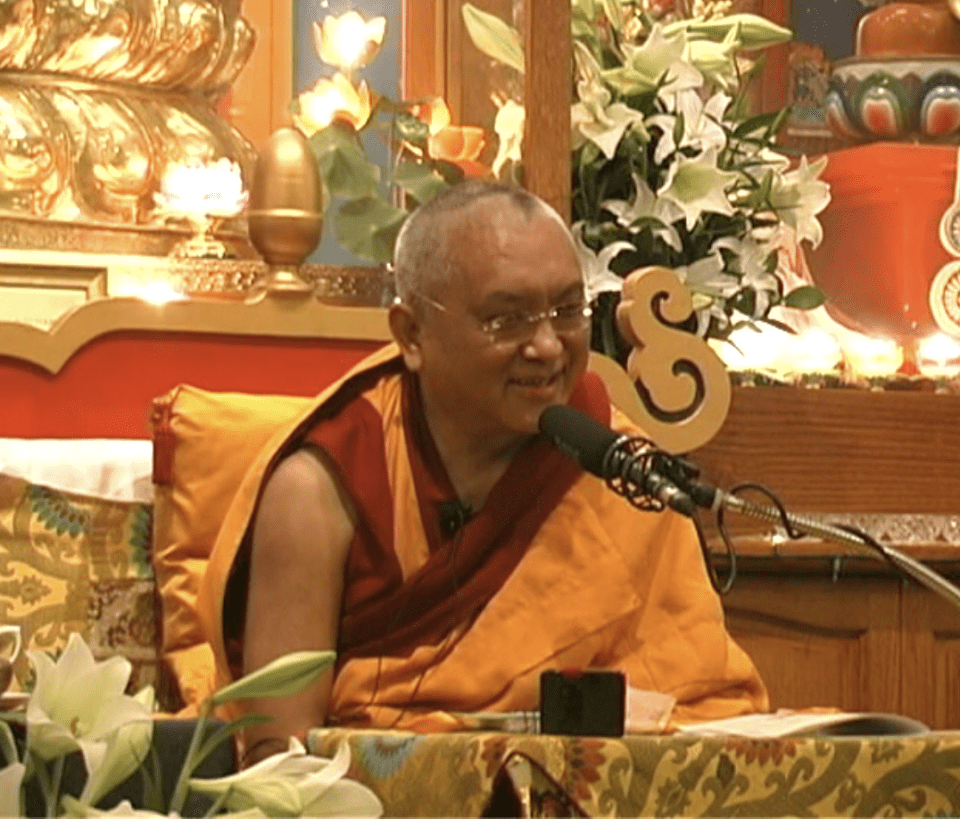
Lama Zopa Rinpoche teaching in Australia, June 2006.
We recently shared news that four sessions of Lama Zopa Rinpoche teaching on the Eight Verses of Mind Training in 2006 from Langri Tangpa Center, Brisbane, Australia are now available on our RAN page. In these teachings Rinpoche covered a wide range of topics, including:
- The nature of emptiness and dependent arising
- How to recognize and refute the false view of inherent existence
- The importance of guru devotion on the spiritual path
- Developing bodhichitta, the altruistic intention to benefit all beings
- Practical advice on transforming daily activities into meaningful spiritual practice
Today we are sharing the second video of these teachings, “Emptiness, Dependent Arising, and Guru Devotion.”
In this session, held on June 16, 2006, Rinpoche starts by explaining on how buddhas guide sentient beings during degenerate times. He explains how the mind is the creator of moment-to-moment happiness and peace as well as the problems in day-to-day life, including depression and loneliness.
Rinpoche teaches on the differences between samsaric pleasure—which is in the nature of suffering as it doesn’t increase and doesn’t last—and lasting Dharma happiness. Rinpoche describes how renunciation, bodhicitta, emptiness, and the tantric path can lead us to ultimate happiness—enlightenment.
In conclusion, Rinpoche teaches on how to make offerings and dedicate merits.
Watch “Emptiness, Dependent Arising, and Guru Devotion”
https://www.youtube.com/watch?v=ZtGyDh4588w
As a reminder, all of these sessions are now available for students to explore as they wish.
Foundation for the Preservation of Mahayana Tradition (FPMT), is a Tibetan Buddhist organization dedicated to the transmission of the Mahayana Buddhist tradition and values worldwide through teaching, meditation and community service.
30
We are so pleased to share that Lama Zopa Rinpoche’s newest volume from Wisdom Publications, The Power of Meditation: A Complete Guide to Transforming Your Mind is now available!
From Wisdom Publications about this new release:
What is meditation, and how do we practice it?
In The Power of Meditation, Lama Zopa Rinpoche, beloved teacher and co-founder of the Foundation for the Preservation of the Mahayana Tradition, offers clear explanations and instructions for the life-changing practice of meditation.
From preparatory procedures, such as selecting a space and adopting the proper motivation, to the details of posture and how to focus the mind, Rinpoche offers step-by-step instruction that serves as both a starting point for beginners and a new vantage on familiar techniques for more experienced sitters. In his own direct and plain-spoken style, Rinpoche offers concise explanations for different kinds of meditation, such as shamatha, or calm abiding meditation, and vipashyana, or insight meditation, delineating their specific techniques and applications. And finally, Rinpoche presents tips for bringing our newfound clarity off of the cushion and into our daily lives, making each moment meaningful.
The Wisdom Culture Series, published under the guidance of Lama Zopa Rinpoche, features translations of key works by masters of the Geluk tradition.
We are so happy to share that Wisdom has offered a coupon for 20% off to the FPMT community by using code: 20POWER at the time of checkout. This is good for both the physical and ebook versions until August 24. You can get your copy from the Wisdom website.
Learn more about this new release from Wisdom Publications and order your copy today:
wisdomexperience.org/product/the-power-of-meditation
Lama Zopa Rinpoche (1945-2023) was the spiritual director of the Foundation for the Preservation of Mahayana Tradition (FPMT), a Tibetan Buddhist organization dedicated to the transmission of the Mahayana Buddhist tradition and values worldwide through teaching, meditation and community service.
17
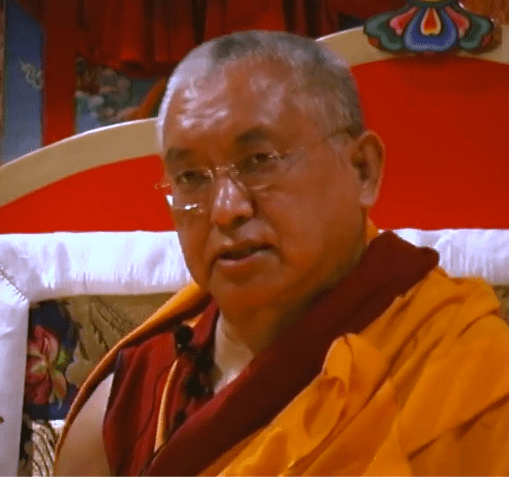
Lama Zopa Rinpoche at Langri Tangpa Center, Australia, April 2006.
Lama Zopa Rinpoche offered a series of teachings at Langri Tangpa Center, Brisbane, Australia from June 16-18, 2006. These four sessions of profound teachings are on the Eight Verses of Mind Training, a classic Tibetan Buddhist text by Kadampa Geshe Langri Tangpa, and offer deep insights into Buddhist philosophy and practice. Rinpoche covers a wide range of topics, including:
- The nature of emptiness and dependent arising
- How to recognize and refute the false view of inherent existence
- The importance of guru devotion on the spiritual path
- Developing bodhichitta, the altruistic intention to benefit all beings
- Practical advice on transforming daily activities into meaningful spiritual practice
We are pleased to share that all four videos from this event are now available on our RAN page.
With his characteristic blend of profound wisdom, personal anecdotes, and occasional humor, Lama Zopa Rinpoche makes these complex teachings accessible to both beginners and experienced practitioners. These sessions offer invaluable guidance for anyone seeking to deepen their understanding of Buddhist philosophy and integrate its principles into their lives.
Today, we are sharing the first video of these teachings, “Guru Devotion, Compassion, and Personal Stories.”
In this first session held on June 16, 2006, Rinpoche begins teaching on the Eight Verses of Mind Training. He emphasizes the importance of guru devotion and explains how all buddhas come from the guru. Rinpoche shares stories about Asanga and Maitreya Buddha to illustrate the power of compassion and perseverance in spiritual practice. He also touches on his own childhood experiences in Nepal, highlighting the hardships and spiritual devotion of the Sherpa people.
Watch “Guru Devotion, Compassion, and Personal Stories”
As a reminder, all of these sessions are now available for students to explore as they wish.
Foundation for the Preservation of Mahayana Tradition (FPMT), is a Tibetan Buddhist organization dedicated to the transmission of the Mahayana Buddhist tradition and values worldwide through teaching, meditation and community service.
12
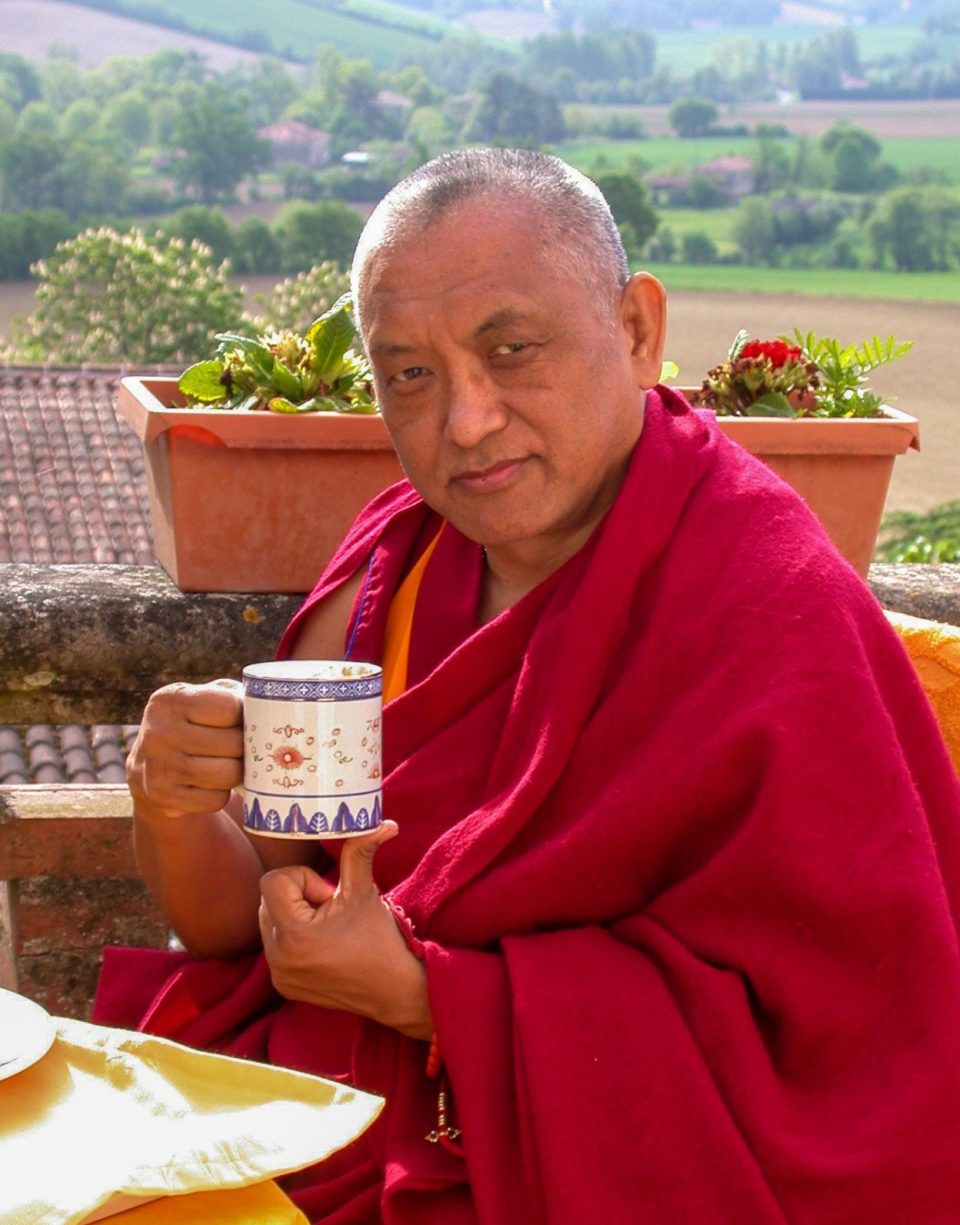
Lama Zopa Rinpoche on the balcony at Institut Vajra Yogini, France, April 28, 2003. Photo by Ven. Roger Kunsang.
Earlier this year we shared the addition to our Rinpoche Available Now page of Lama Zopa Rinpoche’s 2003 twenty-three part teachings from a Four Kadampa Deities Retreat offered at Institut Vajra Yogini, France. The retreat focused on the four Kadampa deities, however, Rinpoche taught on a broad range of lamrim topics.
Today we want to bring to your attention video #1 in this series, “The Minute You Cherish Others, There is Freedom”
Without Lamrim, Rinpoche explained in this teaching, life is seen as problematic, creating suffering and lacking real happiness. Therefore, lamrim practice is more crucial than material wealth, as inner peace and happiness stem from the mind’s development. All forms of happiness, whether mundane or supramundane, ultimately originate from Dharma.
Having a strong mind, imbued with compassion, wisdom, and an understanding of Dharma, helps diminish the impact of life’s difficulties and we can effectively cope with challenges, experiencing more happiness and peace, Rinpoche advised. Universal responsibility is the key to cultivating compassion, preventing harm to others, and bringing peace and happiness. There’s incredible, great urgency to change our own mind, to develop the mind, the good heart.
From waking up to going to sleep, we should approach every action with the intention of serving sentient beings, promoting their happiness, and living a meaningful life rather than the unhealthy mindset of self-cherishing. Happiness arises when one thinks of others rather than focusing solely on oneself. Whenever we cherish the I, the minute we cherish the I, the nature of that thought is not a happy mind, it’s not a relaxed mind, Rinpoche warned. Changing this attitude leads to a sense of freedom and relaxation in the mind.
Scientific evidence has shown a connection between a disturbed mind and physical health issues. Individuals with impatience and a bad temper are more prone to heart attacks. There is a correlation between a self-centered mindset and the ease of experiencing anger and negative emotions.
Watch “The Minute You Cherish Others, There is Freedom”
https://www.youtube.com/watch?v=4RST9v-t3PE
This teaching was given at Institut Vajra Yogini, France as part of a Four Kadampa Deities Retreat from April 18-May 11, 2003. All of the teachings from this event are available for students to engage with as they are able.
Lama Yeshe Wisdom Archive published a blog on this retreat as well, where you can read a lightly edited transcript for each of these teachings as well.
Foundation for the Preservation of Mahayana Tradition (FPMT), is a Tibetan Buddhist organization dedicated to the transmission of the Mahayana Buddhist tradition and values worldwide through teaching, meditation and community service.
27
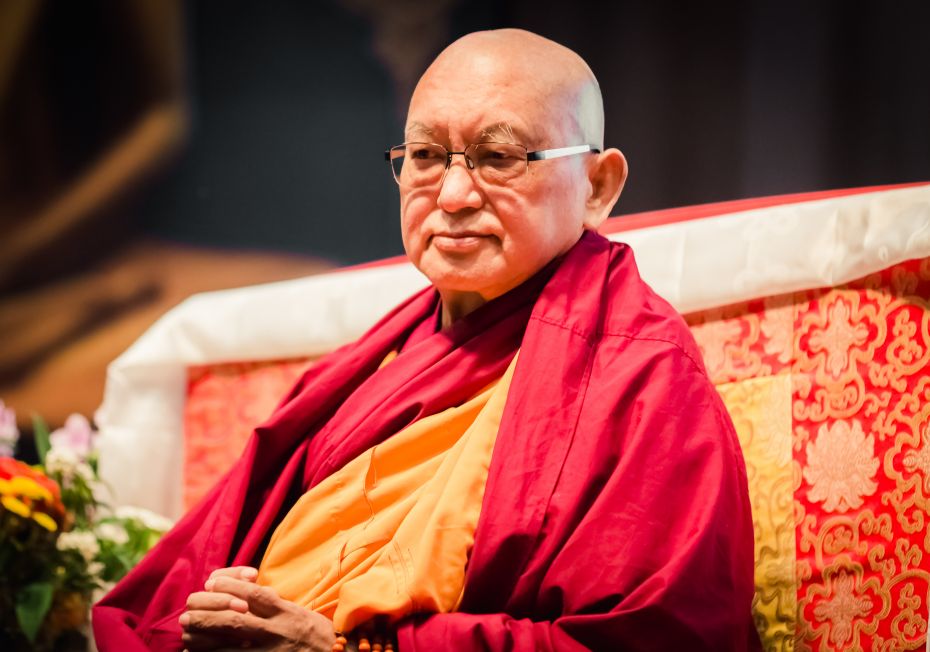
Lama Zopa Rinpoche teaching in Vienna, Austria, September 2017. Photo by Oliver Petermann.
Last month we shared with you ten videos of Lama Zopa Rinpoche’s teachings on emptiness which were shown during the 2024 Heart Sutra Retreat at Kopan Monastery. We hope that students have taken time to explore these teachings, which contain so much wisdom on a variety of topics related to dependent arising.
Today we share the fourth video in this collection of teachings, “How Red and Green Traffic Lights Exist” which is excerpted from a teaching given at Panchen Losang Chogyen Gelug-Zentrum in Vienna, Austria in September 2017.
In this 18 minute extract, Rinpoche uses the example of traffic lights to show how our perception is formed through labeling. He extends this to all phenomena, explaining that everything is merely labeled by the mind but appears inherently existent. Believing in inherent existence is a hallucination, while understanding mere labeling is the essence of the teaching.
Please watch this full video, and feel very free to view the others in this collection as you wish.
Watch “How Red and Green Traffic Lights Exist”
https://www.youtube.com/watch?v=hkwEjCIx938&t=1s
We continue to add videos of teaching events with Lama Zopa Rinpoche, as well as other collections of teachings, that were previously unavailable to our Rinpoche Available Now page. Please take full advantage of this resource and explore the hundreds of hours of teachings Rinpoche left for our benefit.
Please also explore more teachings and videos of Lama Zopa Rinpoche teaching on emptiness.
Lama Zopa Rinpoche (1945-2023) was the spiritual director of the Foundation for the Preservation of Mahayana Tradition (FPMT), a Tibetan Buddhist organization dedicated to the transmission of the Mahayana Buddhist tradition and values worldwide through teaching, meditation and community service.
- Tagged: dependent arising, emptiness
- Home
- News/Media
- Study & Practice
- About FPMT Education Services
- Latest News
- Programs
- New to Buddhism?
- Buddhist Mind Science: Activating Your Potential
- Heart Advice for Death and Dying
- Discovering Buddhism
- Living in the Path
- Exploring Buddhism
- FPMT Basic Program
- FPMT Masters Program
- Maitripa College
- Lotsawa Rinchen Zangpo Translator Program
- Universal Education for Compassion & Wisdom
- Online Learning Center
- Prayers & Practice Materials
- Translation Services
- Publishing Services
- Teachings and Advice
- Ways to Offer Support
- Centers
- Teachers
- Projects
- Charitable Projects
- Make a Donation
- Applying for Grants
- News about Projects
- Other Projects within FPMT
- Support International Office
- Projects Photo Galleries
- Give Where Most Needed
- FPMT
- Shop
Translate*
*powered by Google TranslateTranslation of pages on fpmt.org is performed by Google Translate, a third party service which FPMT has no control over. The service provides automated computer translations that are only an approximation of the websites' original content. The translations should not be considered exact and only used as a rough guide.I want to say without hesitation that the purpose of our life is happiness.







